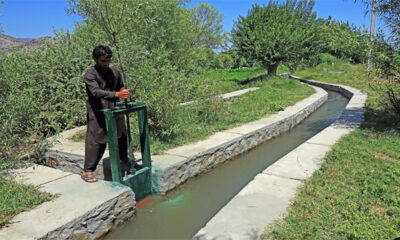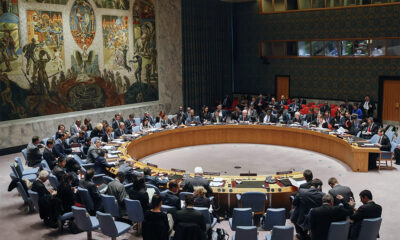Latest News
As US prepared exit, Taliban protected foreign bases, but killed Afghans
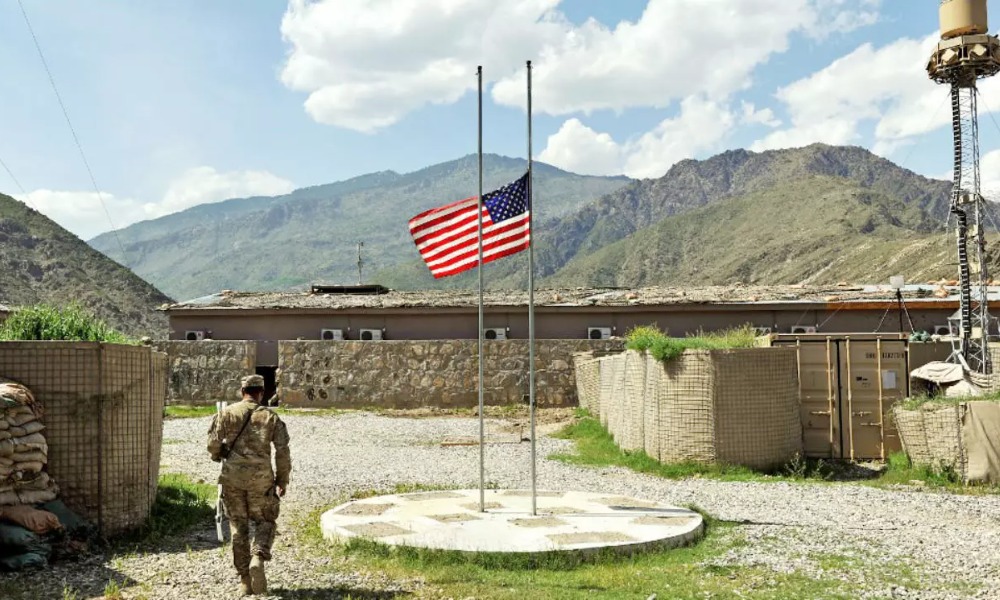
Taliban fighters have protected western military bases in Afghanistan from attacks by rival, or rogue Islamist groups for over a year under a secret annex to a pact for the withdrawal of all U.S. forces by May 1, three Western officials with knowledge of the agreement told Reuters.
The U.S. State Department gave no immediate response to Reuters over the existence of any such document. Nor did it have any immediate comment on what the three officials described as a “Taliban ring of protection”.
Since United States struck a deal with the Taliban in February 2020, paving the way for America to end its longest war, there have been no U.S. combat deaths, and there have been only isolated attacks on U.S. bases, Reuters reported.
Instead, the Taliban intensified attacks on Afghan government forces, and civilian casualties have spiralled.
Peace talks between the militants and the government, begun in September, have made no significant progress, and a U.N. report said civilian casualties were up 45% in the last three months of 2020 from a year earlier.
Testing Taliban patience, U.S. President Joe Biden served notice that the U.S. withdrawal would overshoot the May 1 deadline agreed by the previous U.S. administration, while giving an assurance that it would be completed by September 11 – the 20th anniversary of the al Qaeda attacks on the United States.
When the deadline passes on Saturday, around 2,000 U.S. troops will still be in Afghanistan, according to a western security official in Kabul. The commander of foreign forces in Afghanistan, U.S. Army General Scott Miller earlier this week said an orderly withdrawal and the handing over of military bases and equipment to Afghan forces had begun.
Afghan soldiers left manning those bases could need plenty of firepower to resist any offensive by Taliban fighters who have been occupying strategic positions in surrounding areas, Reuters reported.
In the past two weeks alone, the militants have killed more than 100 Afghan security personnel in a surge of attacks that followed Biden’s announcement that a U.S. withdrawal would take a few months more.
Two of the Western officials said Washington had accepted the Taliban’s offer to shield the western military bases from attacks by the likes of Islamic State (Daesh).
Reuters reported the officials said the Taliban had wanted to demonstrate good faith by meeting a commitment to ensure Afghan soil was not used for attacks on U.S. interests – a key U.S. demand in the February agreement.
“They provided a layer of cover, almost like a buffer and ordered their fighters to not injure or kill any foreign soldier in this period,” said one western diplomat involved in the process.
The western officials said it was also important for the Taliban to show its ability to control the more recalcitrant factions in its movement, like the Haqqani network, which has often followed its own agenda, though its leader Sirajuddin Haqqani is the second-highest ranking commander in the Taliban.
A Kabul-based western security official said that militants had kept their side of the bargain.
“The Taliban swiftly responded to even minor attacks conducted by the Haqqani network and Islamic State fighters around the bases,” he said.
Taliban spokesman Zabihullah Mujahid declined to comment on the so-called “ring of protection” agreement.
More broadly, he said no security guarantee has been given to the United States beyond Saturday’s deadline, but talks were underway among the group’s leadership and with the U.S. side.
“So far our commitment of not attacking the foreign forces is until May 1, after that whether we will attack or not is an issue under discussion,” said Mujahid.
Mullah Baradar, the Taliban’s deputy political chief, held talks with U.S. envoy Zalmay Khalilzad to discuss the peace process on Thursday, another militant spokesman, Suhail Shaheen, said in a Twitter post.
Clearly having the militants holding positions around Western bases presents a danger if no understanding is reached, Reuters reported.
“They’ve definitely moved ever closer to a lot of Afghan and foreign bases,” said Ashley Jackson, co-director of the Centre for the Study of Armed Groups at Overseas Development Institute, a London-based think-tank.
“Encircling U.S., NATO, and Afghan bases seems like the Taliban strategy to poise themselves to take over when foreign forces leave.”
Afghan defence ministry spokesman Fawad Aman said the Taliban had ramped up violence against the Afghan people and their government, while holding fire against foreign forces.
More than 3,000 Afghan civilians were killed and almost 5,800 were wounded in 2020, according to a United Nation report.
“By not attacking the foreign forces but continuously targeting the Afghan security forces and civilians, the Taliban have shown that they are fighting against the people of Afghanistan,” Aman said.
Michael Kugelman, deputy director of the Asia Programme at the Woodrow Wilson Center in Washington, sympathised with that view, saying: “they have every right to lambaste a U.S.-Taliban agreement for failing to bring a semblance of relief to Afghans themselves.”
Latest News
2023 marred by ‘tremendous challenges’ for Afghanistan
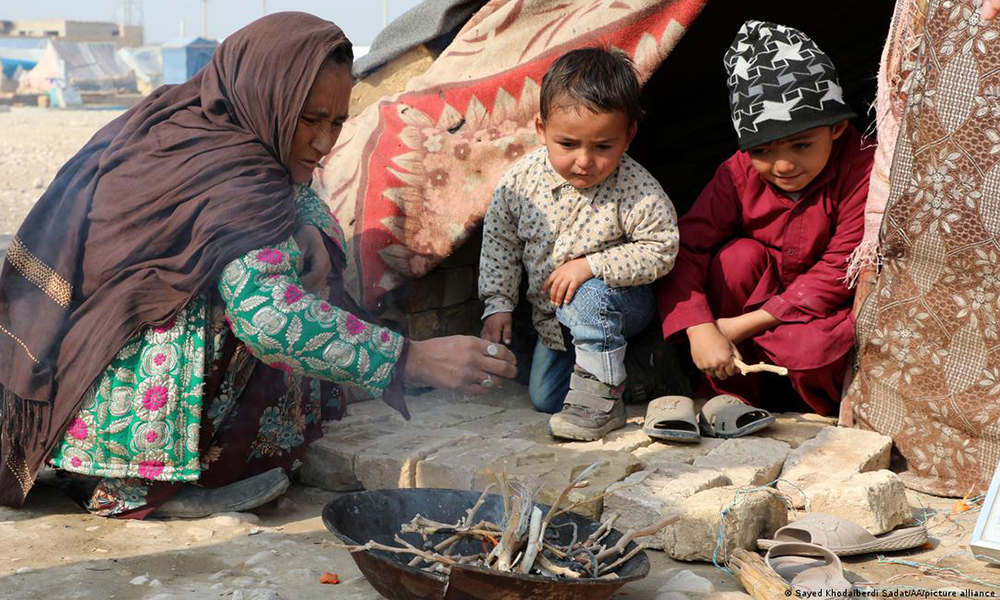
Last year, 2023, was a year of “tremendous challenges” for the people of Afghanistan, but it was also a year marked by resilience and determination, the Deputy Special Representative of the Secretary-General, Resident and Humanitarian Coordinator, Indrika Ratwatte, said in the UN’s annual report on Afghanistan that was published this week.
Ratwatte said: “In the face of adversity and multiple concurrent shocks, the people of Afghanistan have demonstrated remarkable courage and strength.”
Afghans now mention access to food as their most pressing need, he said adding that “unable to pay for or produce basic sustenance, millions face hunger and malnutrition.”
In 2024, an estimated 15.8 million people will experience crisis and emergency levels of food insecurity.
The majority of the population is unable to procure basic needs such as healthcare, food, livelihoods, and housing, the report stated.
The UN found that the country also remains vulnerable to climate change.
Following the worst drought in three decades, emerging El Niño conditions now threaten a new cycle of flooding and crop pests. In this context, lifesaving humanitarian aid has been crucial in preventing the collapse of the social fabric. It has also served to underpin the stability of the economy. Despite growing humanitarian needs, relevant funding cuts have forced humanitarian actors to prioritize the most vulnerable further, the report stated.
A Gallup poll found that 95 percent of the population consider themselves to be suffering. In addition to living in poverty, the average life expectancy in Afghanistan has been falling for the past five years.
The Herat earthquakes and unprecedented large-scale returns of refugees from neighbouring countries, including Pakistan and Iran, have shown the disruptive impact of recurrent shocks and underscored the need for sustained international engagement and support, the UN stated.
“As we embark on the next chapter, in 2024, it is imperative that we remain steadfast in our commitment to the principles of human rights, gender equality, and women’s Empowerment,” Ratwatte said.
“We will continue to include women as key partners in our work, to provide assistance ‘by women, for women’, and to tirelessly work for equal access to education in line with the demands we hear from Afghans in all areas of the country,” he said.
However, from an economic point of view, Afghanistan’s economy appears to be stabilizing at a low equilibrium level following a period of significant contraction since 2021.
The UN said in the report that growth barriers include severely restricted operations in the banking sector (including microfinance institutions), trade disruptions, and institutional issues hindering service delivery, including in the private sector.
“The sudden cessation of a significant amount of international aid and grants, which had accounted for 40 percent of the country’s Gross Domestic Product (GDP), along with a freeze on international reserves amounting to about US$9 billion and the imposition of international sanctions, caused a severe balance of payments, banking and payment systems crisis.
“Notably, financial restrictions have removed liquidity from the banking system,” the report stated.
Despite the crisis and a period of devaluation towards the end of the year, the AFN is 20 percent stronger than it was in 2021 due to currency export controls, UN cash shipments of US dollars into Afghanistan, and personalremittances.
Imports continued to surpass exports through 2023 and increased as the economy contracted.
“This appears to be a paradox: the currency appreciated while the trade deficit widened, suggesting that there might be other unidentified sources of financing besides US dollar cash shipments and remittances to support the account deficits,” the report read.
The UN also said that with its partners, it will work to initiate a dialogue with the Islamic Emirate on adjustments to regulatory frameworks and sustained public service delivery with the aim of creating a long-term and sustainable pathway to reduce aid dependency and put Afghanistan back on a path towards development
“In this regard, we reiterate our offer to the DFA for a dialogue and will work jointly with international partners, donors, and Afghans on how such engagement can be structured in a most productive way.”
Latest News
Beijing hosts Afghan delegation for talks on a wide range of issues

The third meeting of the China-Afghanistan working-level liaison mechanism on humanitarian assistance and economic reconstruction was held in Beijing this week where in-depth talks were held on numerous issues relating to Afghanistan.
Liu Jinson, Director of the Asian Department of China’s Ministry of Foreign Affairs, and Jalali, Director of the Third Political Department of the Ministry of Foreign Affairs of Afghanistan, co-chaired the Beijing meeting.
Also in attendance were representatives from various Chinese commissions, government departments, international aid organizations, as well as the Afghan Ministry of Commerce and Industry, the Ministry of Mines and Petroleum, the Ministry of Disaster Management, and the Ministry of Refugee Affairs.
Quoting an Afghan proverb, Liu said at the meeting that “friends come and go, but neighbors always remain.”
He pointed out that since 2021, China has implemented a diplomatic concept of amity, sincerity, mutual benefit and inclusiveness that was proposed by President Xi Jinping in terms of Beijing’s dealings with Afghanistan.
China has also adhered to a friendly policy towards all Afghan people, and adhered to the principle of respect for the country’s independence, sovereignty and territorial integrity.
He also said that during the different regimes in Afghanistan, China has always provided support and assistance for Afghanistan’s peaceful reconstruction and economic development.
The Afghan delegation meanwhile stated that the Islamic Emirate attaches great importance to developing relations with China, and thanked China for taking the lead in sending a new ambassador to Afghanistan and accepting the appointment of an ambassador to China.
The Islamic Emirate said Afghanistan is willing to deepen friendly relations with China, maintain traditional friendship, and will, as always, support China in safeguarding its core interests and achieving national reunification.
The two sides agreed in the meeting that Afghanistan is currently facing multiple challenges such as floods, droughts, and refugee resettlement, among other issues.
They also noted that the freezing of Afghanistan’s foreign assets by the United States has “aggravated the suffering of the Afghan people.”
The IEA stated however that it was “very grateful to China for its humanitarian assistance over the years and hopes to continue to receive help from China in refugee resettlement, disaster prevention and mitigation, improvement of medical and health conditions, and treatment of children with congenital heart disease.”
On the Belt and Road initiative, the IEA delegation said Afghanistan is deeply satisfied with the progress in practical cooperation between the two countries. They also said Afghanistan is willing to learn from China’s experience in modernization and development, and hopes that China will help Afghanistan cultivate more professional talents.
China meanwhile urged the international community to step up humanitarian assistance to Afghanistan, and said Beijing hopes the IEA will “actively respond to some of the international community’s reasonable concerns about Afghanistan’s inclusive governance.”
Liu in turn acknowledged the IEA’s efforts to promote economic reconstruction and said bilateral trade volume between China and Afghanistan reached US$1.33 billion last year, a record high and a year-on-year increase of 125.4%.
The Islamic Emirate meanwhile said in posts on X that the issue of investment opportunities in Afghanistan was widely discussed and both sides welcomed moves to pave the way for the export of pomegranates.
“Also, both sides talked about the latest developments in increasing the level of oil extraction in Afghanistan and starting the extraction of Logar’s Mes Aynak mine and it was emphasized that plans should be considered to speed things up,” the IEA stated.
“The Afghan side welcomed the capacity building training programs of civil servants in many ministries and agencies of the Afghan government with the support of China. In addition, the Chinese side promised to expand the range of scholarships to Afghan students according to the needs of Afghanistan,” the IEA stated.
Latest News
UN builds 470km of water canals in Afghanistan in past year
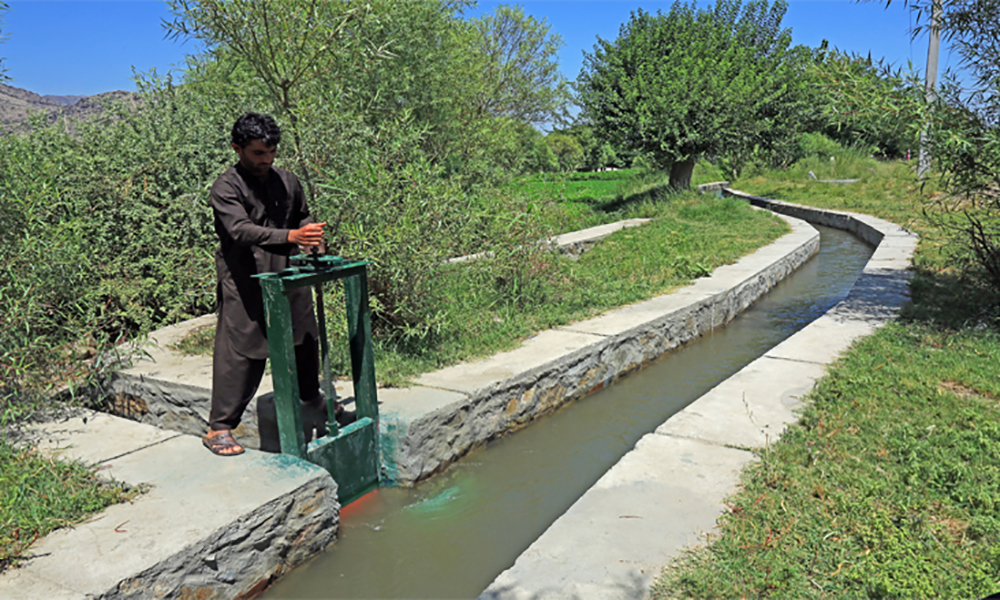
The United Nations has built 470 kilometers of much needed water canals in Afghanistan in the past year in cooperation with local communities, the World Food Program (WFP) confirmed.
WFP in Afghanistan said in a post on X, formerly Twitter, on Wednesday that the canals were built in order to provide access to water to more people across the country.
The agency said the people “in Afghanistan cannot continue their lives without access to water,” adding that the canals help farmers irrigate crops, which allows them to feed their families and sell surplus produce.
This comes after years of drought across the country. However, in the past few months, good rain has been recorded which will hopefully result in good harvests this year.
-

 Sport4 days ago
Sport4 days agoACL draw to be broadcast live on ATN channels
-

 Regional4 days ago
Regional4 days agoIRGC chief warns of harsher response if Israel attacks Iran
-

 Regional5 days ago
Regional5 days agoIran launches retaliatory attack on Israel with hundreds of drones, missiles
-

 Sport3 days ago
Sport3 days agoACL fever grows as fixtures finalized
-

 Latest News4 days ago
Latest News4 days agoContact group on Afghanistan hits roadblock over Pakistan’s gripe with India
-

 Sport4 days ago
Sport4 days agoHetmyer powers Rajasthan win in low-scoring IPL thriller
-
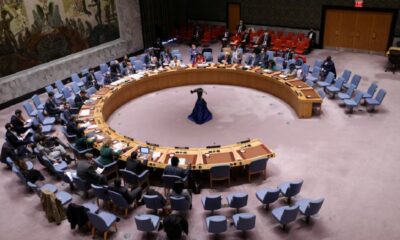
 World4 days ago
World4 days agoUN Security Council to meet Sunday on Iran attack
-

 World4 days ago
World4 days agoUS will not take part in any Israeli retaliatory action against Iran










